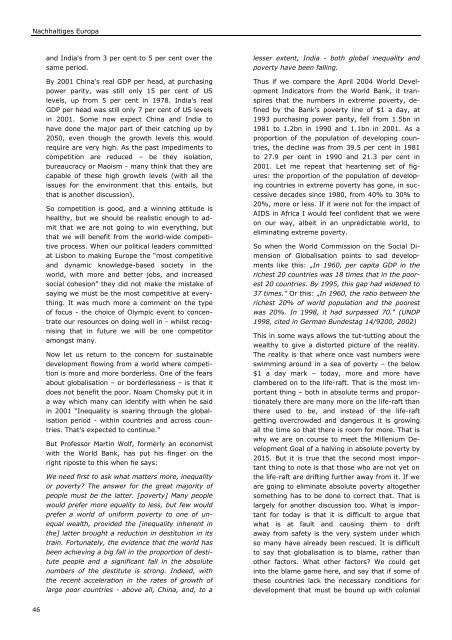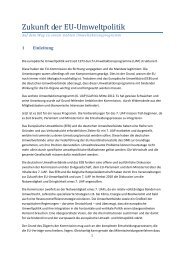Nachhaltiges Europa Abschlusspublikation - Global Marshall Plan
Nachhaltiges Europa Abschlusspublikation - Global Marshall Plan
Nachhaltiges Europa Abschlusspublikation - Global Marshall Plan
Sie wollen auch ein ePaper? Erhöhen Sie die Reichweite Ihrer Titel.
YUMPU macht aus Druck-PDFs automatisch weboptimierte ePaper, die Google liebt.
<strong>Nachhaltiges</strong> <strong>Europa</strong><br />
46<br />
and India's from 3 per cent to 5 per cent over the<br />
same period.<br />
By 2001 China's real GDP per head, at purchasing<br />
power parity, was still only 15 per cent of US<br />
levels, up from 5 per cent in 1978. India's real<br />
GDP per head was still only 7 per cent of US levels<br />
in 2001. Some now expect China and India to<br />
have done the major part of their catching up by<br />
2050, even though the growth levels this would<br />
require are very high. As the past impediments to<br />
competition are reduced – be they isolation,<br />
bureaucracy or Maoism - many think that they are<br />
capable of these high growth levels (with all the<br />
issues for the environment that this entails, but<br />
that is another discussion).<br />
So competition is good, and a winning attitude is<br />
healthy, but we should be realistic enough to ad-<br />
mit that we are not going to win everything, but<br />
that we will benefit from the world-wide competitive<br />
process. When our political leaders committed<br />
at Lisbon to making Europe the “most competitive<br />
and dynamic knowledge-based society in the<br />
world, with more and better jobs, and increased<br />
social cohesion” they did not make the mistake of<br />
saying we must be the most competitive at everything.<br />
It was much more a comment on the type<br />
of focus - the choice of Olympic event to concen-<br />
trate our resources on doing well in - whilst recognising<br />
that in future we will be one competitor<br />
amongst many.<br />
Now let us return to the concern for sustainable<br />
development flowing from a world where competition<br />
is more and more borderless. One of the fears<br />
about globalisation – or borderlessness – is that it<br />
does not benefit the poor. Noam Chomsky put it in<br />
a way which many can identify with when he said<br />
in 2001 “Inequality is soaring through the global-<br />
isation period - within countries and across countries.<br />
That's expected to continue."<br />
But Professor Martin Wolf, formerly an economist<br />
with the World Bank, has put his finger on the<br />
right riposte to this when he says:<br />
We need first to ask what matters more, inequality<br />
or poverty? The answer for the great majority of<br />
people must be the latter. [poverty] Many people<br />
would prefer more equality to less, but few would<br />
prefer a world of uniform poverty to one of un-<br />
equal wealth, provided the [inequality inherent in<br />
the] latter brought a reduction in destitution in its<br />
train. Fortunately, the evidence that the world has<br />
been achieving a big fall in the proportion of destitute<br />
people and a significant fall in the absolute<br />
numbers of the destitute is strong. Indeed, with<br />
the recent acceleration in the rates of growth of<br />
large poor countries - above all, China, and, to a<br />
lesser extent, India - both global inequality and<br />
poverty have been falling.<br />
Thus if we compare the April 2004 World Development<br />
Indicators from the World Bank, it tran-<br />
spires that the numbers in extreme poverty, defined<br />
by the Bank's poverty line of $1 a day, at<br />
1993 purchasing power parity, fell from 1.5bn in<br />
1981 to 1.2bn in 1990 and 1.1bn in 2001. As a<br />
proportion of the population of developing countries,<br />
the decline was from 39.5 per cent in 1981<br />
to 27.9 per cent in 1990 and 21.3 per cent in<br />
2001. Let me repeat that heartening set of figures:<br />
the proportion of the population of developing<br />
countries in extreme poverty has gone, in suc-<br />
cessive decades since 1980, from 40% to 30% to<br />
20%, more or less. If it were not for the impact of<br />
AIDS in Africa I would feel confident that we were<br />
on our way, albeit in an unpredictable world, to<br />
eliminating extreme poverty.<br />
So when the World Commission on the Social Dimension<br />
of <strong>Global</strong>isation points to sad develop-<br />
ments like this: „In 1960, per capita GDP in the<br />
richest 20 countries was 18 times that in the poorest<br />
20 countries. By 1995, this gap had widened to<br />
37 times.“ Or this: „In 1960, the ratio between the<br />
richest 20% of world population and the poorest<br />
was 20%. In 1998, it had surpassed 70.“ (UNDP<br />
1998, cited in German Bundestag 14/9200, 2002)<br />
This in some ways allows the tut-tutting about the<br />
wealthy to give a distorted picture of the reality.<br />
The reality is that where once vast numbers were<br />
swimming around in a sea of poverty – the below<br />
$1 a day mark – today, more and more have<br />
clambered on to the life-raft. That is the most im-<br />
portant thing – both in absolute terms and proportionately<br />
there are many more on the life-raft than<br />
there used to be, and instead of the life-raft<br />
getting overcrowded and dangerous it is growing<br />
all the time so that there is room for more. That is<br />
why we are on course to meet the Millenium De-<br />
velopment Goal of a halving in absolute poverty by<br />
2015. But it is true that the second most important<br />
thing to note is that those who are not yet on<br />
the life-raft are drifting further away from it. If we<br />
are going to eliminate absolute poverty altogether<br />
something has to be done to correct that. That is<br />
largely for another discussion too. What is impor-<br />
tant for today is that it is difficult to argue that<br />
what is at fault and causing them to drift<br />
away from safety is the very system under which<br />
so many have already been rescued. It is difficult<br />
to say that globalisation is to blame, rather than<br />
other factors. What other factors? We could get<br />
into the blame game here, and say that if some of<br />
these countries lack the necessary conditions for<br />
development that must be bound up with colonial
















